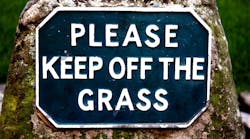Cannabis use among dental patients isn’t new, but as it’s become increasingly legal—recreationally and pharmacologically—the likelihood of dentists encountering patients who’ve used marijuana or another drug before their dental appointment has also increased.
In fact, a new survey from the ADA finds more than half of dentists reporting that they’ve had patients arrive for their actual appointments high on marijuana or another drug, prompting the ADA to release a statement suggesting patients refrain from use prior to appointments.
Going to the dentist high is problematic for a host of reasons, among them that it can limit the care that can be given: The survey found 56% of the dentists who responded reported limiting treatment to patients who were high. Because of how marijuana and anesthesia impact the central nervous system, 46% of surveyed dentists reported sometimes needing to increase anesthesia to treat patients who needed care.
That cycle would seem to introduce a situation counter to the reasons many patients would use marijuana before an appointment to begin with.
“If patients are using marijuana because they are anxious, the challenge is that marijuana may increase the amount of anesthesia needed, which for many is a cause for their anxiety and can lead to a more difficult appointment that may need to be cancelled,” ADA spokesperson Dr. Tricia Quartey said in comments to DentistryIQ.
Tom Viola, RPH, CCP, is a dental pharmacology expert who’s written numerous articles on DIQ and its sister site RDH about the effects of different drugs on dental patients, including cannabis. In “Weed my lips: The not-so-good about cannabis use among patients,” he challenges the idea many people have that marijuana has an across-the-board calming effect.
“One common misconception about cannabis is that since it makes a person ‘mellow,’ it should also make someone calm and less anxious,” wrote Viola. And while low doses of THC will likely induce only mild paranoia or social anxiety, large doses—some products with concentrated forms of cannabis, such as hash and hash oil, can have as much as 80% to 90% THC—can cause exaggerated adverse effects, including dysphoria, agitation, and psychosis, he says.
“As you might guess,” wrote Viola, “this is of concern to dental [professionals] since these exaggerated adverse effects may lead patients to exhibit inappropriate or unexpected behavior during their appointments.”
The ADA poll collected results from 500-plus dentists; the association also polled some 1,000 consumers on marijuana use and vaping, with nearly 39% of respondents indicating they use marijuana.
As to the ADA’s suggestion for patients to refrain from using marijuana before their dental appointments, fewer of them doing so in the future might come down to increased education and communication.
“Asking about marijuana use at the start of the visit as part of health history updates can be a good place to start an open dialogue,” said Quartey, adding that “Legal marijuana use, whether personal or medicinal, is still relatively new, and patients just may not be aware of the possible effects on a dental visit.”






